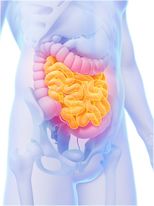|
Your thyroid is a master gland at the base of your neck which helps control your metabolism. If your thyroid function is sub-optimal (on the low side), you may experience symptoms such as fatigue, difficulty losing weight, depression, foggy thinking, hair loss, cold extremities, and feeling burned out. This could be the case even if your thyroid tests look “normal” by conventional standards.
If your thyroid hormones are truly out of the “normal ranges”, you will most likely be prescribed Synthroid or levothyroxine, which is a synthetic form of the thyroid hormone, T4. However, this T4 needs to be converted into the active thyroid hormone, free T3. Many patients that I see have T4 levels that look fine or even on the high side of normal, but they still have symptoms. Giving them more T4 won’t help! We need to promote the proper conversion of T4 into T3, and some patients do better when we switch them from Synthroid to Desiccated Thyroid (which contains a little active T3 in it). So, here are 5 ways to help improve that T4 to T3 conversion, in order to boost your metabolism! 1) Get enough sleep If you aren’t getting enough sleep, you aren’t giving your body a chance to produce enough Growth Hormone (produced in your slumber). Growth Hormone increases that T4 to T3 conversion. If you’re having trouble sleeping, you could also have a melatonin deficiency, a hormone which you produce when it is dark and which helps make you sleepy. Melatonin is also needed for proper T4 to T3 conversion. 2) Get adequate protein in your diet Protein is essential as a building block for tissue repair and proper enzyme function in your body. The average person needs about 60-70 grams of protein per day. You can get this from lean protein sources such as fish, chicken, eggs, nuts, hemp hearts and other seeds, and legumes (however, if you have an autoimmune thyroid issue, some of these may not be recommended). Avoid soy protein sources, especially the non-fermented ones, as they can slow down thyroid function. Enough protein in the diet helps build muscle, decreases fat storage, improves satiety, decreases cravings for sweets, and helps burn more calories. 3) Balance your blood sugar Foods high in sugar or refined carbohydrates (found in processed foods, white flour, fluffy breads, bagels, and most baked goods) spike up your blood sugar, which leads to insulin being released to help bring the sugar into your cells. Guess what insulin does… It decreases the conversion of T4 into T3, resulting in less active thyroid hormone! Eating a mostly plant-based, unprocessed diet, with adequate amounts of protein, helps to balance blood sugar levels, keeping them more steady and avoiding the big insulin-triggering spikes. 4) Decrease stress Chronic stress leads to the production of the stress hormone cortisol. Cortisol interferes with proper metabolism in several different ways. First of all, it decreases the conversion of T4 into T3. It also shunts some of the T4 away from producing T3, and into producing reverse T3 instead. Reverse T3 functions as a brake on metabolism! Also, chronic stress decreases the ability of insulin to effectively bring sugar into the cells, leading to more insulin being needed for the same effect (insulin resistance)! 5) Optimize essential nutrients and vitamins (especially selenium, iodine, zinc, iron, Vitamin A, Vitamin B12, Vitamin D) These essential nutrients are very important for producing enough thyroid hormone, and some are also useful if there is an autoimmune thyroid issue such as Hashimoto’s thyroiditis. Work with a naturopathic doctor to ensure you have optimal levels of these, supplementing when necessary. It is possible to take too much of these too, so make sure you’re taking the right amounts for you! Still feeling sluggish and having trouble losing weight? I can help! Working with a naturopathic doctor can help you eliminate the guesswork, get some testing done, and approach your goal in an individualized and systematic way. There are so many factors as play regarding metabolism, many of which I did not mention here. Come on in for a visit, and we’ll get you started on a program tailored for you! References Bray GA, Smith SR, de Jonge L, Xie H, Rood J, Martin CK, Most M, Brock C, Mancuso S, Redman LM. Effect of dietary protein content on weight gain, energy expenditure, and body composition during overeating: a randomized controlled trial. JAMA. 2012 Jan 4;307(1):47-55. Image from 123RF.com, Copyright: <a href='https://www.123rf.com/profile_magone'>magone / 123RF Stock Photo</a> Scott, TD, Speidel, K. (2017). Essential Elements of Prescription Hormone Compounding. LP3 Network. Conference 2017 Apr 29-30.
2 Comments
 I am seeing more and more patients in my practice affected by autoimmune disease. Some of the more common autoimmune diseases I encounter are Hashimoto’s thyroiditis (a form of hypothyroidism), Graves' disease (a form of hyperthyroidism), Celiac disease (a strong intolerance to gluten), psoriasis (autoimmunity affecting the skin) and rheumatoid arthritis (autoimmunity affecting the joints). There are also some conditions that are not commonly thought of as autoimmune, but may have an autoimmune component and therefore fall on the autoimmune spectrum, including eczema and endometriosis. An interesting question to ask is: What do all these conditions have in common? What Is Autoimmunity? Autoimmunity literally means that your immune system is reacting to components of your own body as if they were foreign invaders! As your immune system develops during infancy, it is trained to differentiate self from non-self, so that it can accurately distinguish what can be harmful to you and what isn’t. Unfortunately, with autoimmunity, the immune system becomes confused and starts to attack self. The 3 Major Contributors To Autoimmune Disease Most people come and see a healthcare practitioner only after they have had symptoms of autoimmune disease for a while, making it difficult to pinpoint and study the origin of autoimmune disease. However, because of the growing incidence of autoimmune disease in North America, there has been more interest recently to study this in more depth. It has been found that there are 3 main triggers for autoimmune disease (Campbell, 2014; Ballantyne, 2013):
Various environmental factors can also trigger autoimmune disease. These include bacterial and viral infections (that result in the formation of autoantibodies because the bacteria or viruses’ proteins look similar to our own proteins), heavy metals, chemical toxicants, silicone breast implants, emotional stress, vitamin and nutrient deficiencies, and drugs (Campbell, 2014; Ballantyne, 2013; Myers, 2015). Last but not least of the 3 known triggers is a leaky gut (aka increased intestinal permeability). This is perhaps THE most important trigger. The current research suggests that leaky gut is a NECESSARY precursor to autoimmune disease! That means that, even if you have the genetic susceptibility and an environmental trigger but if your gut barrier is intact, you won’t develop autoimmune disease. Isn’t that great news? The current research suggests that leaky gut is a NECESSARY precursor to autoimmune disease! What Is “Leaky Gut”?
Your gut is a continuation of your skin inside of you, and as such, it functions as a barrier between the outside world and the inside world. Therefore, to work properly, it can’t just let anything through into the bloodstream. There are tight junctions between each cell of the gut lining preventing most things from reaching the bloodstream before they are properly digested. Also, a huge part of your immune system is found right within the tissues surrounding the gut, sampling what’s coming in and making sure it’s “safe”. Beyond your own cells, the beneficial bacteria in your gut are also essential for proper digestion and immunity, and also act as a line of defence to prevent pathogens from getting through. When your gut barrier becomes compromised and hyperpermeable, it allows food particles and pathogens through which shouldn’t be there. A gut can become leaky through (Ballantyne, 2013):
What Can You Do To Help Repair A Leaky Gut? Fortunately, there are many things you can do to help heal a leaky gut! It does require a lot of work, since no supplement can replace improving your diet and lifestyle. Avoiding some of the food triggers that damage the gut and replacing them with whole, unprocessed foods is extremely important for lasting changes. You can identify your food triggers through a specific elimination diet. IgG food sensitivity testing can also be helpful to guide you in avoiding foods that are causing the most damage in your case. Supplements to help eliminate toxins and heal the gut lining are also very important, but you need to eliminate the triggers first before supplements can do their job properly. Stool testing can identify if you have an imbalance in your good gut bacteria. Stress management is also critical in helping your gut heal. A chronic leaky gut can also lead to malabsorption of vital nutrients that are necessary to help your gut heal, so I often do some testing to target supplementation to what each specific patient needs. Re-inoculating the gut with specific probiotics is also very important. I have seen many patients’ health improve after we implement an individualized protocol based on these principles. The changes can sometimes be very dramatic! If you are suffering from an autoimmune condition and are ready to make some diet and lifestyle changes, I invite you to come on in for an initial assessment. I’d love to help you! Now, I’d like to hear from you! What autoimmune condition have you struggled with? Have you seen dietary and lifestyle changes make an impact on your health? Can you identify with some of the triggers I’ve mentioned? In health, Dr. Tamar References Ballantyne, S. (2013). The Paleo Approach: Reverse autoimmune disease and heal your body. Las Vegas, Nevada: Victory Belt Publishing. Campbell, A. W. (2014). Autoimmunity and the Gut. Autoimmune Diseases, 2014, 1-12. doi:10.1155/2014/152428 Myers, A. (2015). The Autoimmune Solution: Prevent and reverse the full spectrum of inflammatory symptoms and diseases. New York, New York: Harper One. Image 1 copyright: <a href='http://www.123rf.com/profile_sph1410'>sph1410 / 123RF Stock Photo</a> Image 2 copyright: <a href='http://www.123rf.com/profile_eraxion'>eraxion / 123RF Stock Photo</a> Over the years, I have seen many patients who have been struggling with their weight in my Ottawa practice. Many have tried multiple strategies without lasting success before coming to see a naturopathic doctor. Trying to lose weight can be an emotional roller coaster, and is often not simply a matter of willpower and portion control. The only way to truly make a difference in the long run is to address the underlying cause(s) of weight gain.
I am excited to share with you some of the key points I talked about in my recent “Wellness for Weight Loss” seminars at the Ottawa Public Library. These are my top 5 weight loss sabotagers that I screen for in patients who are having difficulty losing weight. Top 5 Hidden Causes of Weight Gain 1. Malnutrition Despite the large amount of food available to us, most North Americans following the Standard American Diet (appropriately referred to as the “SAD” diet) are overfed but undernourished! This diet is low in essential nutrients that are needed for proper metabolism and hormone balance. Without these nutrients, we can experience hunger even while eating larger quantities of food, since the body is still starving for those nutrients. Eating a whole food, varied diet, high in vegetables and omega-3 fatty acids, can help decrease inflammation in the body and help with proper hormone balance. 2. Blood Sugar Imbalances Some carbohydrates in foods convert to sugar in the bloodstream faster than others. To prevent excessive storage of blood sugar into fat, you want your blood sugar to stay tightly regulated, with no sharp rises or dips. This is because sharp rises in blood sugar triggers the release of insulin, a hormone that controls blood sugar levels and storage into fat. As long as insulin levels are high, you cannot burn fat from adipose tissue because your body is focusing on storing excess blood sugar into triglycerides and then into fat cells. Foods that are high in simple carbohydrates and low in protein and fibre will cause an initial spike in blood sugar, leading to an initial energy boost. However, this is short-lived and is quickly followed by a dip as the sugar is taken up into cells and stored, leading to low blood sugar, low energy, and hunger cravings. And what do we typically reach for when we are hungry and in a hurry? High carbohydrate foods, which just perpetuate the cycle! Keeping your blood sugar more even by eating the right foods can make a big difference. 3. Food Sensitivities Many people have underlying food sensitivities which are causing inflammation in their body, hindering weight loss. Identifying and eliminating food sensitivities may decrease chronic inflammation which fuels obesity. Food sensitivities are delayed immune-mediated reactions to foods, which can occur anytime from eating the food and up to 72 hours after. The body can produce excessive amounts of a type of antibody called immunoglobulin G, or IgG, which recognizes and attaches to specific proteins in food particles. (This is different from the typical anaphylactic allergic reactions we hear about, which are mediated by a different type of antibody called IgE.) Common symptoms of food sensitivities include digestive issues (gas, bloating, constipation, diarrhea), feeling like food “just sits there”, foggy thinking, migraine headaches, fatigue, difficulty losing weight, or skin issues (acne, eczema, psoriasis). If you suspect that you might have a food sensitivity, a naturopathic doctor can help you identify problematic foods through IgG food sensitivity testing (blood test) or an elimination diet. 4. Chronic Stress All of us go through stressful periods. Usually, we can recover after a short-term stress and go on with our lives. However, we often don’t realize the detrimental impact of long-term, chronic stress on our bodies. Our body deals with any long-term stress through the adrenal glands (“ad” means “near” and “renal” means “the region of the kidneys”), which produce cortisol. If you tend to gain weight in your mid-section, chances are chronic stress (or sugar imbalances) may be an issue. Over time, high cortisol leads to the breakdown of muscle mass (decreasing metabolic rate), decreased production of active thyroid hormone, depressed mood, cravings for sweets, fats, and salty food, and central weight gain. Learning stress management tools and using the appropriate nutritional supplementation can help you improve your metabolism and help you lose weight around the middle. 5. Thyroid Dysfunction Optimal thyroid function is very important for anyone who is trying to lose weight. The thyroid controls metabolism and therefore weight. An underactive thyroid, or hypothyroidism, is associated with weight gain, depressed mood, cold intolerance, constipation, and many other symptoms. Think about what would happen in your body if you slowed down how quickly everything worked, and you could explain most symptoms of hypothyroidism. If you have symptoms but your thyroid has been tested and found to be “normal”, there still could be a problem with your thyroid. I look for optimal rather than normal levels in those patients, and often order a complete thyroid panel (TSH, fT3, fT4, TPO) to make sure everything is functioning as well as it could. As mentioned above, chronic stress can also impair the way thyroid hormone is used by the tissues, and may be a reason you could have symptoms when your lab tests appear normal. So that’s it: 5 underlying causes of weight gain to look out for! Are there any that you think could apply to you? If you have been struggling with weight for some time and want to treat the underlying cause, come on in for a visit at my clinic! |
AuthorDr. Tamar Ferreira is a Naturopathic Doctor in Brampton, Ontario. Her areas of focus include digestive health, hormone balance, and skin conditions. Topics
All
Archives
May 2020
|
118 Queen St. W., Suite 205
Brampton, ON
L6X 1A5
905-451-3963





 RSS Feed
RSS Feed